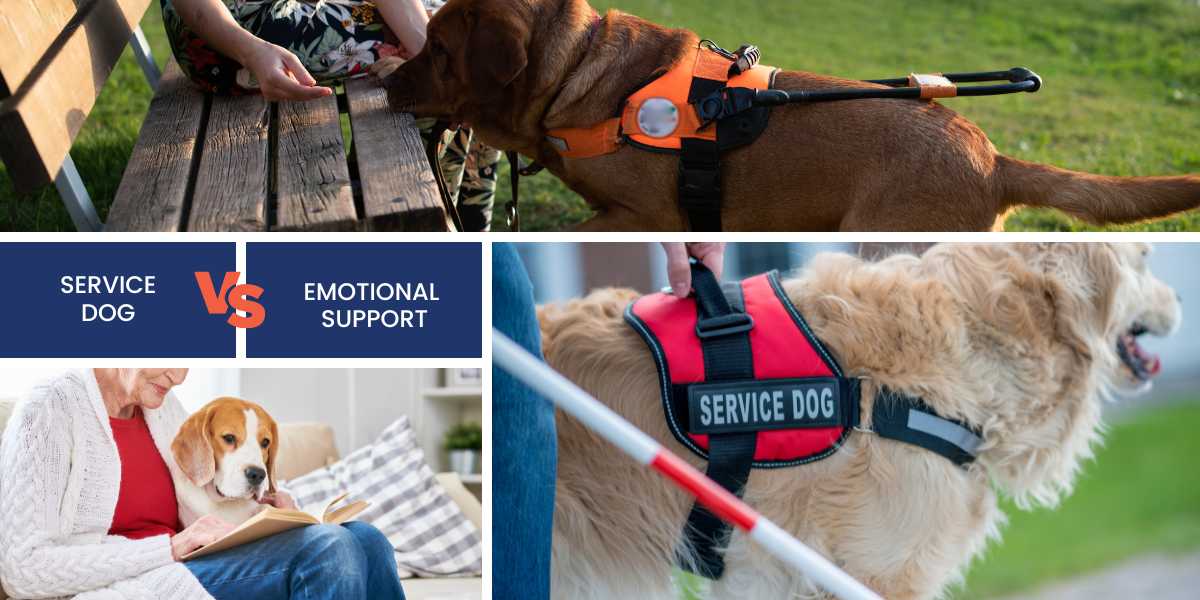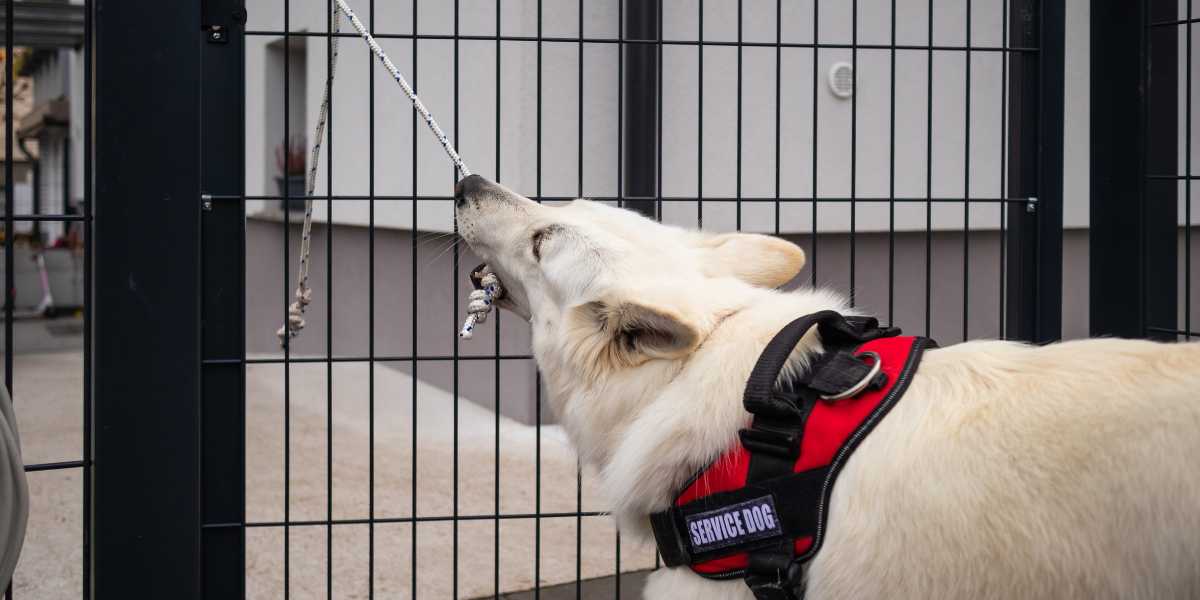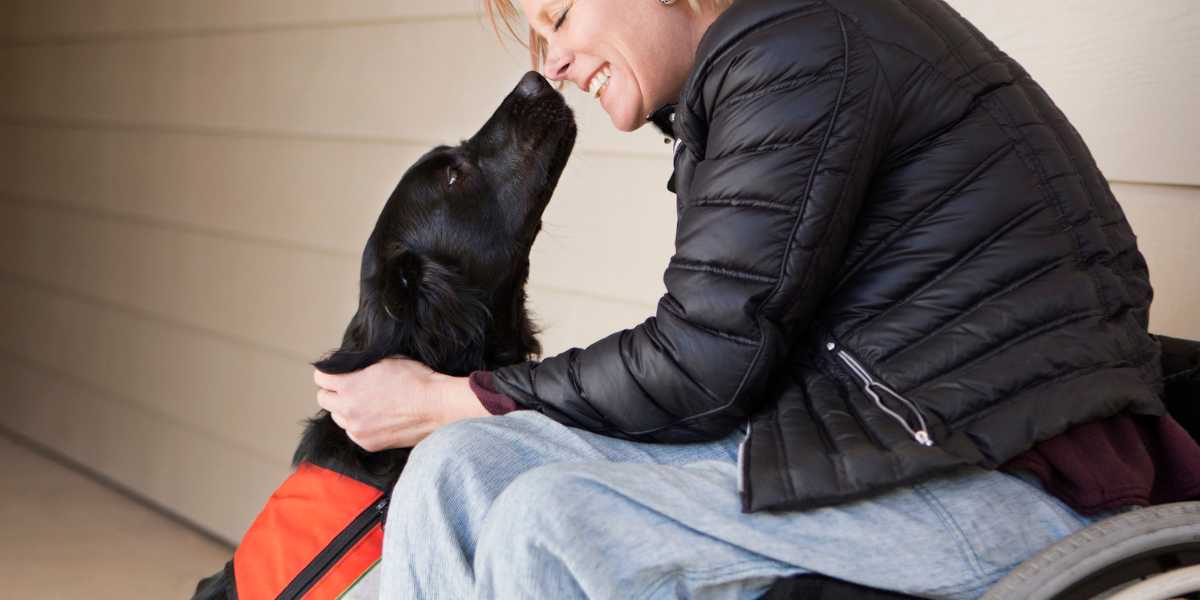When it comes to the differences between service dogs and emotional support dogs, understanding their unique roles and functions is crucial. Service dogs are highly trained to perform specific tasks that assist individuals with disabilities, while emotional support dogs provide companionship and emotional comfort. In this article, we’ll explore the key differences between service dogs and emotional support dogs, including their training, access rights, and the important role they play in the lives of those who rely on them.
What is a Service Dog?
Service dogs are highly trained to perform specific tasks that assist individuals with disabilities. These tasks are crucial for the daily functioning and independence of their handlers.
Examples of Tasks Performed by Service Dogs:
- Alerting to medical episodes
- Guiding individuals with limited or no vision
- Assisting with mobility
For example, some service dogs can alert their humans to an oncoming medical episode or guide those with limited or no vision.
What is an Emotional Support Dog?
Emotional support dogs provide companionship and emotional comfort to individuals. Unlike service dogs, emotional support dogs are not trained to perform specific tasks for disabilities.
Training and Limitations of Emotional Support Dogs:
- Emotional support dogs are not required to undergo specialized training.
- They are not trained to perform tasks related to disabilities.
Access Rights for Emotional Support Dogs:
- Emotional support dogs do not have the same public access rights as service dogs.

Service Dog Registration
Misconceptions About Registration
There is actually no such thing as “registering” your service dog. Many websites assert that you can “register your dog,” but it’s important to note that these websites do not validate a dog as a genuine service dog and are not acknowledged under the ADA.
- No Official Registry: The ADA does not recognize any official service dog registry.
- Misleading Websites: Buying a certificate and vest does not make your dog a service dog.

Public Access Rights
Where Can Service Dogs Go?
Service dogs can accompany their owners almost anywhere, including:
- Restaurants
- Shops
- Hospitals
- Schools
- Hotels
Businesses are only allowed to ask two questions:
- Is the dog required because of a disability?
- What tasks is the dog trained to perform?
Where Can Emotional Support Dogs Go?
Emotional support dogs do not have the same access rights and are often restricted from many public places.
Impact of Untrained Dogs
Due to people claiming their emotional support dogs are service dogs and bringing untrained dogs into public spaces, many businesses have become more stringent with their policies. This misrepresentation can jeopardize the safety and independence of individuals with disabilities who rely on genuine service dogs.

Importance of Service Dogs
Service dogs are not just pets; they are highly trained professionals. They perform specific tasks that benefit individuals with disabilities, essentially acting as a medical device for their handlers.
Training and Costs of Service Dogs:
- Service dogs undergo extensive training, often taking up to two years.
- The cost of training a service dog can amount to tens of thousands of dollars, covering professional trainers, veterinary care, and continuous evaluation.
Respecting Service Dogs
Understanding and respecting the roles and boundaries of service dogs is crucial. Disrupting a service dog, whether by petting, calling, or offering food, can interfere with their ability to perform life-saving tasks, potentially putting their handler at risk.

Celebrate and Support Service Dogs Today!
Join us in honoring the incredible service dogs that play a vital role in the lives of individuals with disabilities. Help us spread awareness about the crucial differences between service dogs and emotional support dogs.
How You Can Help:
- Share This Post: Educate others about the importance and rights of service dogs.
- Respect and Recognize: Always respect the working boundaries of service dogs and their handlers.
- Support Service Dog Organizations: Consider donating to or volunteering with organizations that train and support service dogs.
Service Dog Training Organizations
These organizations are well-respected in the field of service dog training and have a proven track record of helping individuals with disabilities lead more independent lives.
Canine Companions
Website: Canine Companions
Overview: Canine Companions provides highly trained service dogs to adults, children, and veterans with disabilities, enhancing their independence.
The Seeing Eye
Website: The Seeing Eye
Overview: The Seeing Eye is the oldest existing guide dog school in the world, providing specially trained guide dogs for people who are blind or visually impaired.
Paws With A Cause
Website: Paws With A Cause
Overview: Paws With A Cause trains assistance dogs for people with disabilities and provides lifetime support for those partnerships.
National Education for Assistance Dog Services (NEADS)
Website: NEADS
Overview: NEADS provides world-class service dogs to veterans, children with autism, and adults with physical disabilities, hearing loss, and other needs.
K9s For Warriors
Website: K9s For Warriors
Overview: K9s For Warriors is dedicated to providing service dogs to veterans suffering from PTSD, traumatic brain injury, and/or military sexual trauma.
Disclaimer:
Please note that we do not receive any compensation or incentives for promoting the websites mentioned in this post. These links are provided solely for informational purposes to help our readers find credible organizations that train service dogs. We are not responsible for the content, accuracy, or opinions expressed on these external websites. Visitors are encouraged to review the privacy policies and terms of use on any linked site before engaging with the services or information provided.

